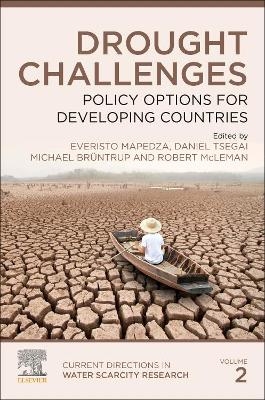
Drought Challenges
Elsevier Science Publishing Co Inc (Verlag)
978-0-12-814820-4 (ISBN)
Everisto Mapedza is a Senior Researcher at the International Water Management Institute (IWMI) based in the West Africa office in Accra, Ghana. His interests include institutions, governance, social transformation and gender using the land, water and broadly natural resources lens in the context of developing countries. He is currently a member of the Executive Council of the International Association for the Study of the Commons (IASC). Dr. Mapedza was previously a Research Fellow at the London School of Economics and Political Science (LSE). Daniel Tsegai is Programme Officer at the Secretariat of the United Nations Convention to Combat Desertification (UNCCD). Dr. Tsegai was also Programme Officer at the UN-Water and Senior Researcher at the University of Bonn. Mr. Brüntrup works at the German Development Institute / Deutsches Institut für Entwicklungspolitik (DIE) as a senior researcher. His interests cover topics related to agriculture and rural development, trade policy and food security with a geographical focus on Sub-Saharan Africa. Since 2017, he is Germany's "Science and Technology Correspondent" for the United Nations Convention to Combat Desertification, (UNCCD). Robert McLeman is Professor of Geography and Environmental Studies at Wilfrid Laurier University in Waterloo, Canada. A former diplomat, Dr. McLeman is an internationally recognized expert on environmental migration. He researches the relationship between drought, migration, and population change in rural areas.
1. Introduction 2. Drought, migration, and conflict: What are the links and policy options? 3. Lessons from the El Nino-Induced Drought for the Southern Africa Development Community 4. Latin America and Caribbean and Northeast Brazil 5. Drought in the Yucatan: Maya Perspectives on Tradition, Change, and Adaptation 6. Drought adaptation in rural Colombia 7. Drought and the Gendered Livelihoods implications for smallholder farmers 8. Integrating regional climate and drought characteristics for effective assessment and mitigation of droughts in India 9. Assessment, monitoring, and early warning of droughts: the potential for satellite remote sensing and beyond 10. Drought Monitoring and assessment in South Asia: Focus on integration of satellite technology and the future of food security 11. Early Warning Systems for drought and violent conflict - towards potential cross-pollination 12. Making weather index insurance rational and effective for agriculture and livestock forage: Policy lessons from Andhra Pradesh 13. Drought Risk Insurance 14. An assessment of early warning systems to drought resilience among agricultural communities in Tanzania, Kenya and Mali 15. Impact of Climate Smart Agriculture on Resilience of Households to Climate Change in Northern Uganda 16. Can Social Protection Schemes deliver Resilience? Evidence from Rural Ethiopia 17. Drought responses and livestock management strategies after severe drought in semi-arid area, Laikipia, Kenya 18. Building resilience to drought among small scale farmers in East African drylands: technological options and governance perspectives 19. Drought preparedness in the Arid Lands of Kenya: What have we learned? 20. Achieving policy coherence for drought resilient food security in SSA – lessons from the Horn of Africa 21. Managing water scarcity in dryland Colorado 22. Conclusion
| Erscheinungsdatum | 04.09.2019 |
|---|---|
| Reihe/Serie | Current Directions in Water Scarcity Research |
| Sprache | englisch |
| Maße | 191 x 235 mm |
| Gewicht | 720 g |
| Themenwelt | Naturwissenschaften ► Biologie ► Ökologie / Naturschutz |
| Naturwissenschaften ► Geowissenschaften ► Hydrologie / Ozeanografie | |
| ISBN-10 | 0-12-814820-9 / 0128148209 |
| ISBN-13 | 978-0-12-814820-4 / 9780128148204 |
| Zustand | Neuware |
| Haben Sie eine Frage zum Produkt? |
aus dem Bereich


